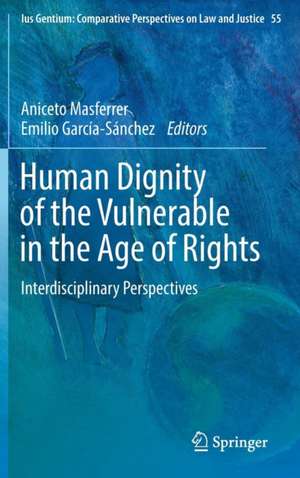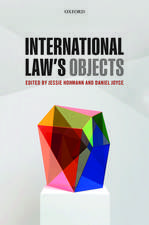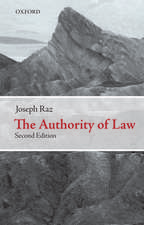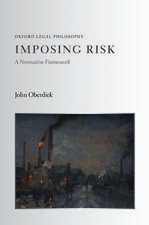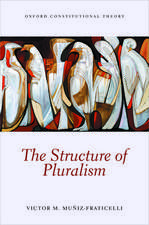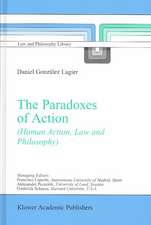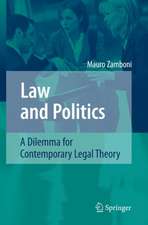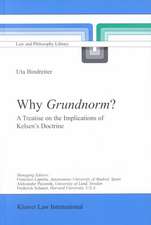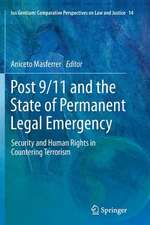Human Dignity of the Vulnerable in the Age of Rights: Interdisciplinary Perspectives: Ius Gentium: Comparative Perspectives on Law and Justice, cartea 55
Editat de Aniceto Masferrer, Emilio García-Sánchezen Limba Engleză Hardback – 5 sep 2016
A concept of human dignity which discards or deniesthe dignity of the vulnerable and weak is at odds with the real humancondition. Even those individuals who might seem more skilled and talented arefragile, vulnerable and limited. We need to realize that human condition is notlimitless. It is crucial to re-discover a sense of moderation regardingourselves, a sense of reality concerning our own nature. Some lines of thoughttake the opposite view. It is sometimes argued that humankind is – or is calledto be – powerful, and that the time will come when there will be novulnerability, no fragility, no limits at all. Human beings will become likeGod (or what believers might think God to be). This perspective rejects humanvulnerability as in intrinsic evil. Those who are frail or weak, who are notautonomous or not able to care for themselves,do not possess dignity. In this volume it is claimed that vulnerability is aninherent part of human condition, and because human dignity belongs to allindividuals, laws are called to recognize and protect the rights of all ofthem, particularly of those who might appear to be more vulnerable and fragile.
| Toate formatele și edițiile | Preț | Express |
|---|---|---|
| Paperback (1) | 839.76 lei 38-45 zile | |
| Springer International Publishing – 15 iun 2018 | 839.76 lei 38-45 zile | |
| Hardback (1) | 849.89 lei 38-45 zile | |
| Springer International Publishing – 5 sep 2016 | 849.89 lei 38-45 zile |
Din seria Ius Gentium: Comparative Perspectives on Law and Justice
- 20%
 Preț: 1128.14 lei
Preț: 1128.14 lei - 20%
 Preț: 1565.15 lei
Preț: 1565.15 lei - 18%
 Preț: 1115.28 lei
Preț: 1115.28 lei - 18%
 Preț: 904.28 lei
Preț: 904.28 lei - 18%
 Preț: 1001.81 lei
Preț: 1001.81 lei -
 Preț: 180.18 lei
Preț: 180.18 lei - 24%
 Preț: 787.30 lei
Preț: 787.30 lei - 18%
 Preț: 1115.28 lei
Preț: 1115.28 lei - 15%
 Preț: 635.31 lei
Preț: 635.31 lei - 18%
 Preț: 1108.67 lei
Preț: 1108.67 lei - 18%
 Preț: 1007.97 lei
Preț: 1007.97 lei - 18%
 Preț: 784.79 lei
Preț: 784.79 lei - 18%
 Preț: 1223.11 lei
Preț: 1223.11 lei - 18%
 Preț: 891.02 lei
Preț: 891.02 lei - 18%
 Preț: 1009.40 lei
Preț: 1009.40 lei - 18%
 Preț: 1005.74 lei
Preț: 1005.74 lei - 18%
 Preț: 1014.89 lei
Preț: 1014.89 lei - 18%
 Preț: 896.70 lei
Preț: 896.70 lei - 15%
 Preț: 641.85 lei
Preț: 641.85 lei - 18%
 Preț: 779.71 lei
Preț: 779.71 lei - 18%
 Preț: 1010.79 lei
Preț: 1010.79 lei - 18%
 Preț: 1010.03 lei
Preț: 1010.03 lei - 18%
 Preț: 950.52 lei
Preț: 950.52 lei - 15%
 Preț: 638.76 lei
Preț: 638.76 lei - 18%
 Preț: 947.50 lei
Preț: 947.50 lei - 20%
 Preț: 564.76 lei
Preț: 564.76 lei - 18%
 Preț: 1115.14 lei
Preț: 1115.14 lei - 18%
 Preț: 939.42 lei
Preț: 939.42 lei - 15%
 Preț: 635.80 lei
Preț: 635.80 lei - 15%
 Preț: 637.59 lei
Preț: 637.59 lei - 15%
 Preț: 643.65 lei
Preț: 643.65 lei - 24%
 Preț: 809.15 lei
Preț: 809.15 lei
Preț: 849.89 lei
Preț vechi: 1118.28 lei
-24% Nou
Puncte Express: 1275
Preț estimativ în valută:
162.62€ • 169.79$ • 134.59£
162.62€ • 169.79$ • 134.59£
Carte tipărită la comandă
Livrare economică 31 martie-07 aprilie
Preluare comenzi: 021 569.72.76
Specificații
ISBN-13: 9783319326917
ISBN-10: 3319326910
Pagini: 344
Ilustrații: XV, 338 p.
Dimensiuni: 155 x 235 x 21 mm
Greutate: 0.67 kg
Ediția:1st ed. 2016
Editura: Springer International Publishing
Colecția Springer
Seria Ius Gentium: Comparative Perspectives on Law and Justice
Locul publicării:Cham, Switzerland
ISBN-10: 3319326910
Pagini: 344
Ilustrații: XV, 338 p.
Dimensiuni: 155 x 235 x 21 mm
Greutate: 0.67 kg
Ediția:1st ed. 2016
Editura: Springer International Publishing
Colecția Springer
Seria Ius Gentium: Comparative Perspectives on Law and Justice
Locul publicării:Cham, Switzerland
Cuprins
Prefaceand Acknowledgements.- 1. Vulnerability and Human Dignity in the Age of Rights; Aniceto Masferrer and Emilio García-Sánchez.- PART I: Human Dignity of the Vulnerable: Ethical andAnthropological Perspectives.- 2. Vulnerability as a Part of Human Nature; Alfredo Marcos.- 3. Ethics of Vulnerability; Adela Cortina and Jesús Conill.- 4. Vulnerable: To be between life anddeath; Aquilino Cayuela.- 5. TheVulnerability of Life in the Philosophy of Hans Jonas; Paolo Becchi and oberto Franzini Tibaldeo.- PART II: Human Dignity of the Vulnerable: Biomedical andSociological Perspectives.- 6. Biotechnologies inside the self: newchallenges in clinical ontology; Luis Echarte.- 7. Paradoxes of authenticity: aneuroscientific approach to personal identity; Luis Echarte.- 8. Vulnerability at the endof life: A medical perspective; Joaquim Bosch and oan Vidal.- 9. Cosmetic Vulnerability. The newface of human fragility; Emilio García-Sánchez.- PART III: Human Dignity of the Vulnerable in the Age ofRights: Historical, Legal Philosophical and Political Perspectives.- 10. Taking Human Dignity more Humanely A Historical Contribution to the Ethical Foundations of Constitutional Democracy; Aniceto Masferrer.- 11. Is vulnerability the foundation ofhuman rights?; Roberto Andorno.- 12. The final fragility of the human beingand the ‘right’ to die: biojuridical considerations; Claudio Sartea.- 13. Taking Vulnerability Seriously: WhatDoes It Change for Bioethics and Politics?; Corine Pelluchon.- 14. The principle of respect for humanvulnerability and assisted reproductive technologies; Vicente Bellver.
Notă biografică
Aniceto Masferrer is Professor of Legal History andteaches legal history and comparative law at the Faculty of Law, University ofValencia, Spain. He is the author of eight books (including his SpanishLegal Traditions. A Comparative Legal History Outline (Madrid, 2009; 2012,2nd ed,)) and the editor of six (including Masferrer, A (ed.), Post 9/11 and the State of Permanent Legal Emergency: Securityand Human Rights in Countering Terrorism(Springer, 2012), Masferrer, A & Walker, C(eds.) Counter-Terrorism, Human Rights And The RuleOf Law. Crossing Legal Boundaries inDefence of the State (EdwardElgar Publishing, 2013), and Masferrer, A., LaCodificación española. Una aproximación doctrinal e historiográfica a susinfluencias extranjeras, y a la francesa en particular (ThomsonReuters-Aranzadi, 2014)), and sixtybook chapters/articles published in Spanish, European and American lawjournals. He has published extensively on criminal law from an historical andcomparative perspective, as well as on the codification movement andfundamental rights in the Western legal tradition. He has been a fellowresearcher at the Institute Max-Planck for European Legal History (2000-03),Visiting Professor at the University of Cambridge (2005), Visiting Scholar atHarvard Law School (2006-07) and at Melbourne Law School (2008), and VisitingProfessor at the University of Tasmania (2010), Visiting Scholar at LouisianaState University – The Paul M. Hebert Law Center – (2013), Visiting Scholar atGeorge Washington University Law School (as the Recipientof the Richard & Diane Cummins Legal History ResearchGrant for 2014), and VisitingProfessor at the École Normale Supérieure– Paris (2015). He haslectured at universities around the world (France, Germany, Belgium, TheNetherlands, Malta, Israel, United Kingdom, Sweden, Norway, USA, Canada,Australia and New Zealand). He is a member of the advisory board of severalSpanish, European, Anglo-American and Asian Law Journals, and the Chief Editorof GLOSSAE. European Journal of LegalHistory. He ismember of the American Society for LegalHistory, the current president of the EuropeanSociety for Comparative Legal History (from 2010), and vice-president ofthe Fundación Universitas. He is alsothe Director of the Institute for Social,Political and Legal Studies, member of the Spanish Royal Academy of Jurisprudence andLegislation, and board member of the ValencianCommittee for European Affairs.
Emilio García-Sánchez is Biologist and Postgraduate Masters in Bioethics (University ofNavarra, 2010). He defended his thesis Master on The return of virtue bioethics tothe crisis of nature. He currently teaches Bioethics at the Faculties of Medicine and Nursing CEUCardenal Herrera University (Valencia,Spain). He is the main researcher of Bioethics Research Group at his university. His main linesof research are ethical and sociologicalanalysis of human vulnerability in today's culture: health and bioethical implications. He haspublished two articles on the recognitionof the nature and dignity in the terminally ill. The latest in the Journal of Bioethics: ‘Therescue of the human in the patient whodies’ (2012). He was also the Editor of the issue nr 77 (vol. 23: ‘Eugenics in Today's Society’) ofthe Journal of Bioethics (May 2012).He is currently working on bioethical issues raised by the aesthetic medicine. He haspublished an article on this subject: “The tyranny of perfection. BioethicalImplications” (July 2013). He was Visiting Scholar atInstitute of Ethics (Dublin City University) (July-September 2014) and atKennedy Institute of Ethics (Georgetown University, Washington DC)(August-November 2015).
Emilio García-Sánchez is Biologist and Postgraduate Masters in Bioethics (University ofNavarra, 2010). He defended his thesis Master on The return of virtue bioethics tothe crisis of nature. He currently teaches Bioethics at the Faculties of Medicine and Nursing CEUCardenal Herrera University (Valencia,Spain). He is the main researcher of Bioethics Research Group at his university. His main linesof research are ethical and sociologicalanalysis of human vulnerability in today's culture: health and bioethical implications. He haspublished two articles on the recognitionof the nature and dignity in the terminally ill. The latest in the Journal of Bioethics: ‘Therescue of the human in the patient whodies’ (2012). He was also the Editor of the issue nr 77 (vol. 23: ‘Eugenics in Today's Society’) ofthe Journal of Bioethics (May 2012).He is currently working on bioethical issues raised by the aesthetic medicine. He haspublished an article on this subject: “The tyranny of perfection. BioethicalImplications” (July 2013). He was Visiting Scholar atInstitute of Ethics (Dublin City University) (July-September 2014) and atKennedy Institute of Ethics (Georgetown University, Washington DC)(August-November 2015).
Textul de pe ultima copertă
This volume is devoted to exploring a subject which,on the surface, might appear to be just a trending topic. In fact, it is muchmore than a trend. It relates to an ancient, permanent issue which directlyconnects with people’s life and basic needs: the recognition and protection ofindividuals’ dignity, in particular the inherent worthiness of the mostvulnerable human beings. The content of this book is described well enough byits title: ‘Human Dignity of theVulnerable in the Age of Rights’. Certainly, we do not claim that only thehuman dignity of vulnerable people should be recognized and protected. Werather argue that, since vulnerability is part of the human condition, humanvulnerability is not at odds with human dignity. To put it simply, humandignity is compatible with vulnerability.
A concept of human dignity which discards or deniesthe dignity of the vulnerable and weak is at odds with the real humancondition. Even those individuals who might seem more skilled and talented arefragile, vulnerable and limited. We need to realize that human condition is notlimitless. It is crucial to re-discover a sense of moderation regardingourselves, a sense of reality concerning our own nature. Some lines of thoughttake the opposite view. It is sometimes argued that humankind is – or is calledto be – powerful, and that the time will come when there will be novulnerability, no fragility, no limits at all. Human beings will become likeGod (or what believers might think God to be). This perspective rejects humanvulnerability as in intrinsic evil. Those who are frail or weak, who are notautonomous or not able to care for themselves,do not possess dignity. In this volume it is claimed that vulnerability is aninherent part of human condition, and because human dignity belongs to allindividuals, laws are called to recognize and protect the rights of all ofthem, particularly of those who might appear to be more vulnerable and fragile.
A concept of human dignity which discards or deniesthe dignity of the vulnerable and weak is at odds with the real humancondition. Even those individuals who might seem more skilled and talented arefragile, vulnerable and limited. We need to realize that human condition is notlimitless. It is crucial to re-discover a sense of moderation regardingourselves, a sense of reality concerning our own nature. Some lines of thoughttake the opposite view. It is sometimes argued that humankind is – or is calledto be – powerful, and that the time will come when there will be novulnerability, no fragility, no limits at all. Human beings will become likeGod (or what believers might think God to be). This perspective rejects humanvulnerability as in intrinsic evil. Those who are frail or weak, who are notautonomous or not able to care for themselves,do not possess dignity. In this volume it is claimed that vulnerability is aninherent part of human condition, and because human dignity belongs to allindividuals, laws are called to recognize and protect the rights of all ofthem, particularly of those who might appear to be more vulnerable and fragile.
Caracteristici
Offers a much needed general ethical framework to tackle a wide range of new ethical challenges Ties in with a greatly transformed health sciences field Brings together a variety of disciplines to come to a generally accepted ethical framework
